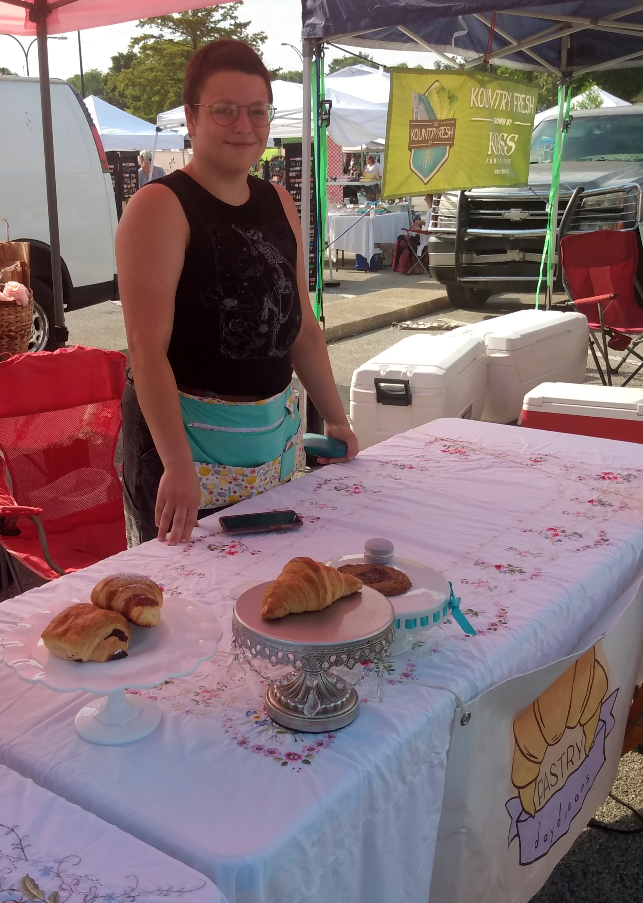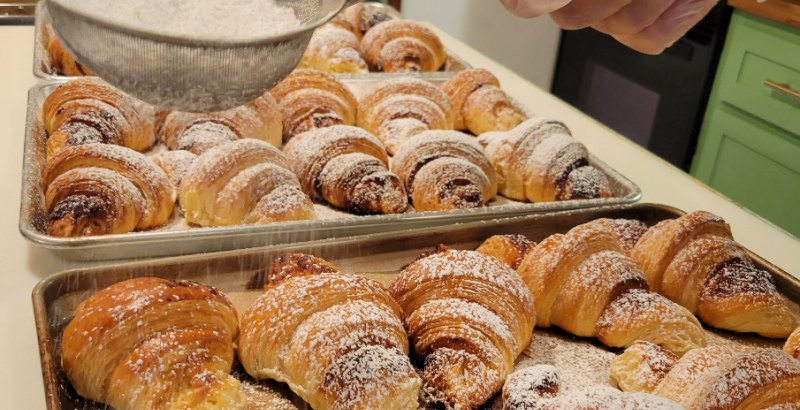Regulars of the Urbana Farmers’ Market may recall there was a newcomer last year: Pastry Daydreams. I remember being taken slightly aback when I was handed a cardboard box containing not one but two croissants and advised to heat them up in a warm oven before eating. But I did as I was told, and they turned out to be some of the best I’ve had in C-U.
Since then, they’re my next market stop right after Nitro Cup. Sure, they’re not the only ones selling baked goods at the market, but there’s something about a delicious homemade croissant or pain au chocolat with my morning coffee that always gets my Saturday going on the right foot. And it’s especially dangerous now that they’ve started selling single servings!
I caught up with founder and baker Kat “Felix” Fuenty for a long overdue look into how Pastry Daydreams got started, what it’s like to operate a cottage food business in Illinois, and where they want to go from here. Here’s what they had to say.
(Some responses have been lightly edited for clarity.)
Smile Politely: How did you first become interested in pastry baking? How did you learn?
Kat Fuenty: I’ve been interested in baking since I was very young, but my interest in pastries specifically is a bit more recent. I battled anorexia in 2018 and 2019. During that time, I lost interest in most of my hobbies. I was very interested in food since I was hungry basically all the time. Baking became my artistic outlet. I started researching celebrity bakers, watching baking shows, and reading up on the science that makes it work. The more I learned, the more advanced techniques I wanted to try.
I learned a lot from my research, but the best way for me to learn is by doing. I would schedule a day where I didn’t have anything else to do and buckle down for the sixteen hours my cookbook told me it would take to make croissants. I made a lot of mistakes over many batches, but each one got a little bit better.

Photo by Michael O’Boyle.
SP: What made you want to start selling your pastries?
Fuenty: During the time when food was my primary interest, I was baking a lot. My partner Dustin and I couldn’t eat it all ourselves, and we would both bring my baking into work and to social gatherings. People enjoyed my baking and began telling me that I should consider selling my work. I thought that it sounded like a good way to handle all the extra sweets that I was making, and I started looking into selling baked goods under the Illinois cottage food law.
SP: What was it like to open in the middle of the pandemic?
Fuenty: It was uncertain and experimental. I was doing something I’d never tried before in the midst of an unpredictable situation. It was honestly kind of scary, but I think it’s good to do scary things once in a while.
I actually delayed my business opening by a year because of the pandemic. I had intended to apply to the farmers’ market in 2020, but I didn’t want to start a new business at the height of COVID. I spent that year perfecting my croissant recipe, developing my business model, and testing ingredients to use in my final products.
SP: Can you talk about what was involved in starting a cottage food business? How does it differ from a brick-and-mortar restaurant or bakery?
Fuenty: There are quite a few differences in the law between starting a cottage food business and a brick-and-mortar business. It was a bit more difficult before the Home to Market Act went into effect on January 1, 2022: at that time, the only venues that cottage food producers could sell at were farmers’ markets. Now, cottage food producers are free to sell directly from their homes to customers!
Starting a cottage food business involves doing quite a bit of homework. I had to start by getting my Certified Food Protection Manager certificate, which involved a full day of training and an exam. After getting that, I applied for my Cottage Food Operation license through the county health department, and to Urbana’s Market at the Square for a vendor slot.
In addition to the certifications and applications, there was a lot of work to do on my end to ensure that my products would be high-quality and fairly priced. I tested six different croissant recipes, five different types of butter, and three different types of vegan butter to determine what would work best for my business. I also put together a spreadsheet to track how much it cost me per unit to make my products, so that I could price them accordingly.
There are also differences in the kinds of products that cottage food producers can make, the way they must be packaged, and the fact that they are not generally inspected by the health department. Everything must be safe at room temperature which means no cream, cheese, meat, or cut vegetables in the baked goods (except buttercreams and fillings that have been tested by a lab to be non-hazardous). Additionally, cottage food products must all be prepackaged and labeled with a full list of ingredients and a notification that the goods were produced in a home kitchen that is not subject to health inspection. The health department is able to inspect cottage food operations, but it generally is not done unless a customer has a complaint.

Photo by Kat Fuenty.
SP: What was involved in setting up a booth in the farmers’ market?
Fuenty: The first thing I had to do was apply to the market, so that I could be sure that I would get a space. The market won’t accept too many vendors selling similar things, so I had to be sure to get my application in early! There were a lot of upfront costs involved in setting up the booth. I paid my fees in advance of the season, and then had to buy everything for the booth itself: the tent, the folding tables, the sign, the decorations, boxes, tablecloths, and decorations.
People eat with their eyes first, so I wanted to be sure that I had a visually appealing setup. I also had to prep for making my products. My croissant recipe takes three days to make, and I go through about seven pounds of butter for each market. I had to ensure that I had a steady supply of ingredients, and that I was turning out enough product each week.
SP: What kinds of pastries do you sell? What is your favorite to bake (or eat)?
Fuenty: Every week, I have three varieties of croissants and two varieties of vegan croissants. I will usually have two other products each week, depending on what’s in season and what I want to bake. Most recently, it was brown butter chocolate chunk cookies and lavender lemon macarons!

Photo by Kat Fuenty.
My favorite thing to bake may be my basic croissant. It’s a technical challenge, especially because the plain croissant doesn’t have any fillings to fall back on. I have to get each step just right to turn out the product that I want, and it’s so satisfying to pull a pan of perfectly browned croissants out of the oven. Plus, they make my house smell awesome.
SP: Who is your favorite Champaign-Urbana baker?
Fuenty: There are a lot of great bakers in town, but Manon from Six Red Chairs is pretty excellent. She’s a really sweet lady, and her baked goods are excellent. She sells at the market, as well!
SP: What is your favorite part of Pastry Daydreams?
Fuenty: Since I’m no longer so fixated on the food part of the business, I’ve really started enjoying the people part. I love meeting new customers and seeing regulars at the market. If I had to pick one specific thing that I like best, it would be seeing little kids go absolutely bananas when they try something they really like. Never change, little kids.

Photo by Michael O’Boyle.
SP: Do you have any future plans for the business? (Or new pastries you want to bake?)
Fuenty: Since I can sell directly to customers now, I’ve started offering custom orders. So far, I’ve mostly been making cakes for people, but I would also like to start selling custom orders of croissants and other pastries.
SP: How can people get your pastries?
Fuenty: You can find me at the farmers’ market every other weekend or reach out to me through my website where I also list all the products that I currently make.
Fuenty and Pastry Daydreams can also be found on Facebook and Instagram.
Editor’s Note: A previous version of this article’s summary used incorrect pronouns for Kat Fuenty. The article has now been updated. We regret this error.
Pastry Daydreams
Urbana Market at the Square
Sa 7 a.m. to noon








